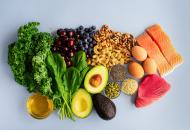As you age, a sluggish metabolism often gets the blame for unwanted weight gain. And many diet programs and supplements promise to give your metabolism a “boost” to make it easier to shed pounds. But how much control do you actually have over your body’s calorie-burning capacity? The answer: not as much as you probably think. Yet it’s not completely out of your hands either. Below, experts set the record straight on metabolism and your weight, how it changes as you get older, and what you can really do to burn more calories.
Metabolism 101
When experts talk about metabolism, they’re referring to physical and chemical processes in the body that convert calories from food and drinks into energy. Each of us has a resting metabolic rate, or the amount of energy that the body uses to carry out basic functions when you’re completely at rest. Those functions include:
- Breathing
- Circulation
- Digestion
- Muscle contractions
- Temperature control
This accounts for between 50% and 70% of the calories you burn every day.
Some people’s bodies need more energy to carry out these functions than others. Bodies that need more energy have faster metabolisms, while those that need less energy have slower metabolisms.
This can have some impact on your weight, says Mir Ali, M.D. He’s a bariatric surgeon and medical director of MemorialCare Surgical Weight Loss Center at Orange Coast Medical Center in Fountain Valley, California. “We all know a skinny person who can eat whatever they want without gaining an ounce,” he says. “Whereas those with slower metabolisms can gain weight when they increase their calorie intake by just a little bit.”
Genetics play a big role in which group you fall into, Dr. Ali adds. But your age, sex, muscle mass and activity level also have a part in it. While not all of those things can be changed, a few of them can. And that’s where you may be able to gain some control over your metabolism and weight.
Getting older can affect your metabolism and your waistline. But a Noom membership can help you lose weight. Try this personalized plan, with medications if you need them.
What really happens to metabolism as you age?
If your belly seems to be growing with each passing birthday, you’re not alone. Our bodies really do accumulate more fat as we get older.
That partly has to do with the normal, age-related loss of lean muscle tissue, which burns more calories than fat, explains Lisa Young, Ph.D. She’s a registered dietitian nutritionist and author of Finally Full, Finally Slim, as well as an adjunct professor of nutrition at New York University. That loss of lean muscle leads to a slower resting metabolic rate — and easier weight gain.
But the age that our metabolism actually shifts into “low and slow” isn’t so clear. While people often notice their weight starting to creep up after age 40, research from Duke University suggests that our metabolic slowdown doesn’t really take hold until we hit our 60s. And even then, the calorie-burning drop happens extremely gradually.
So, what accounts for the weight gain that so many of us experience in our 40s and 50s? Experts aren’t sure, but it could partially be from simple lifestyle changes that set in as we get older.
“When your kids are young, you’re running around more with them, taking them everywhere. Once they’re out of the house, you don’t have to do that,” Dr. Ali says. (That can certainly be the case if you don’t have kids, too.) Suddenly, you can indulge in more sedentary activities like watching TV or having a predinner cocktail.
Losing weight can be tough, especially as people get older. A Noom membership offers support, guidance and medications if you need them. Learn more.
4 ways to rev up your metabolism
Just because your metabolism slows down as you get older doesn’t mean there’s nothing you can do to stop gaining weight. Remember, your resting metabolic rate only accounts for 50% to 70% of the total calories you burn. The remaining 30% to 50% depends on factors that are within your control.
Strategies to help keep your metabolism humming at the speediest rate possible include:
- Maintain your muscle (and try to build some more). “When your lean muscle tissue is declining, you’re essentially burning fewer calories,” Young says. But research shows that resistance exercises such as lifting weights can help stave off age-related muscle loss. At a minimum, aim for 30 minutes of muscle-strengthening activity, twice a week.
- Get some aerobic exercise. Heart-pumping activities such as brisk walking, cycling or swimming can boost your total calorie burn for the day. Try to get at least 30 minutes, 5 times per week. “You want to maintain your activity level as you age, not reduce it,” Dr. Ali says.
- Find ways to move more. Physical activity doesn’t have to come in the form of a workout. Pacing while you’re on the phone, climbing the stairs instead of taking the elevator, and carrying grocery bags can all add up to more calories burned.
- Eat plenty of protein. Digesting food burns calories, but protein-rich foods are bigger calorie-burners than other types of food. Dr. Ali explains that the body has to work harder — use more energy/calories — to digest protein versus carbohydrates and fats. So, try to make sure you have a source of lean protein at every healthy meal: Think poultry, seafood, lean red meat, eggs, low-fat yogurt, tofu or beans.
Getting older doesn’t mean you are doomed to gain weight forever and ever. A few smart lifestyle changes can boost your metabolism and give your overall health a lift. Sometimes, though, your metabolism needs a bigger boost to rev it up. That’s where a Noom membership, with access to GLP-1s if you need them, can help. Go online or call a licensed insurance agent at 1-844-211-7730 for more information.
Compliance code: 50498-X-1223
Sources:
Centers for Disease Control and Prevention. “How much physical activity do adults need?” June 2022. Retrieved from https://www.cdc.gov/physicalactivity/basics/adults/index.htm
Harvard T.H. Chan School of Public Health. “Energy Balance: Totaling Up Energy Expenditure.” Retrieved from https://www.hsph.harvard.edu/obesity-prevention-source/energy-balance/ Accessed July 13, 2023.
National Institute on Aging. “How can strength training build healthier bodies as we age?” June 2022. Retrieved from https://www.nia.nih.gov/news/how-can-strength-training-build-healthier-bodies-we-age
National Library of Medicine: MedlinePlus. “Aging changes in body shape.” July 2022. Retrieved from https://medlineplus.gov/ency/article/003998.htm
National Library of Medicine: MedlinePlus. “Metabolism.” June 2022. Retrieved from https://medlineplus.gov/ency/article/002257.htm
National Library of Medicine: MedlinePlus. “Ways to burn more calories every day.” June 2022. Retrieved from https://medlineplus.gov/ency/patientinstructions/000894.htm
Science. “Daily energy expenditure through the human life course.” August 2021. Retrieved from https://www.science.org/doi/10.1126/science.abe5017










